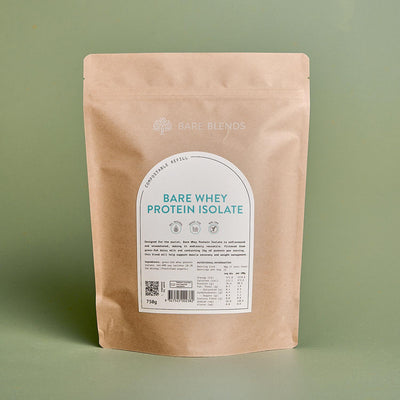The Essential Role of Protein in Weight Management
The right protein supplement can serve as a powerful tool in your weight management arsenal.

Bare Blends
2023-06-23

In the world of nutrition and fitness, protein is often heralded as a superstar macronutrient. But why does protein enjoy such a lofty reputation? What makes it so crucial for weight management and losing weight? At Bare Blends, we're dedicated to delivering insights about how the right nutrition can support a healthier you, so we’ve created this article to shed light on the subject.
What is Protein and Why is it Essential?
Protein, a compound made up of amino acids, is one of the three main macronutrients (the other two being fats and carbohydrates). This essential nutrient plays a crucial role in various bodily functions, such as repairing tissues, making enzymes, and boosting immunity.
For individuals looking to manage their weight, protein's significance becomes even more prominent.
Protein and Satiety: Keeping Hunger at Bay
One of protein's top claims to fame in weight management is its impact on satiety, or the feeling of fullness. Consuming protein-rich foods slows down digestion, making you feel fuller for longer and curbing the urge to overeat.
According to a review published in the American Journal of Clinical Nutrition, higher-protein diets can lead to reduced calorie intake, which naturally contributes to weight loss. This effect is due to the increased production of satiety hormones and decreased levels of the hunger hormone ghrelin.
Protein and Thermogenesis: Boosting Metabolism
Protein has a higher thermic effect than other macronutrients, which means your body uses more energy (calories) to digest it compared to fats and carbohydrates. This phenomenon is known as diet-induced thermogenesis (DIT).
A study in the Journal of the American College of Nutrition found that the thermic effect of protein is approximately 15-30%, compared to 5-10% for carbs and 0-3% for fats. This higher thermic effect essentially boosts your metabolism, allowing you to burn more calories and thus, potentially helping with weight loss.
Protein and Muscle Mass: Preserving Lean Body Mass
Protein plays a vital role in muscle repair and growth. Having more muscle can increase your resting metabolism, helping you burn more calories even when you're not exercising. So, consuming adequate protein while losing weight can help preserve lean body mass and maintain a higher metabolic rate.
How Much Protein Do We Need?
The recommended dietary allowance (RDA) for protein is 46 grams for women and 56 grams for men per day. However, for weight loss and management, many studies suggest that a higher protein intake, between 1.2 to 2.0 grams of protein per kilogram of body weight, could be beneficial. As always, individual requirements may vary, so it's essential to consult with a healthcare provider or a nutritionist for personalized advice.
The Bare Blends Advantage
At Bare Blends, we believe in the power of natural, whole-food protein sources. Our range of protein powders offer not only high-quality protein but also a wealth of other nutrients that support overall health. Whether you're a fitness enthusiast or someone looking to manage weight, our blends are designed to fuel your journey towards a healthier lifestyle.
Remember, weight management isn't about quick fixes. It's about sustainable, healthy changes to your diet and lifestyle – and protein plays a pivotal role in this journey.
The right protein supplement can serve as a powerful tool in your weight management arsenal. Explore the Bare Blends range today and discover the difference that premium quality protein can make in your health journey.

Bare Whey Protein Isolate
- NZ grass-fed whey protein isolate
- Unflavoured & unsweetened
- Weight loss & build strength
References:


